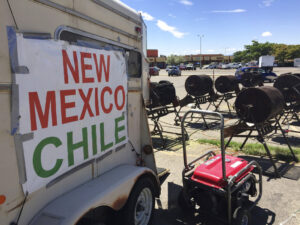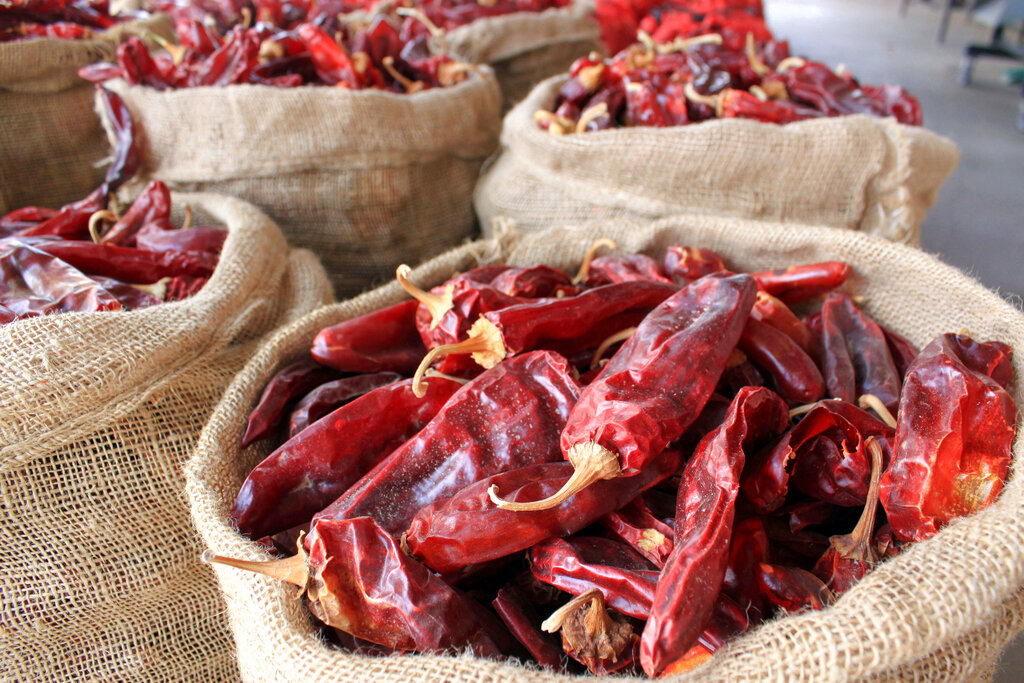When Covid hit in 2020, many New Yorkers found themselves stuck in a locked-down city, searching for comfort — Melissa Klein, John Watterberg, and Eric See included.
After some thought, See and Watterberg, both Albuquerque natives, looked to fill that void with hometown comfort food, like smothered green chile chicken enchiladas. However, being roughly 2,000 miles away from a traditional New Mexican meal, these Brooklyn residents — who didn’t know each other at the time — had to look elsewhere.
“We live in New York City, and you can get anything at any hour of the day if you wanted,” Klein, who’s married to Watterberg, said. “Except [New Mexican]. Let’s figure out how to do it.”
Enter the restaurants Ursula and Santa Fe BK.
The two wildly popular Brooklyn restaurants — opened by See, and Klein and Watterberg, respectively — are at the forefront of bringing New Mexican cuisine to New York. Now their reputation for their breakfast burritos has garnered long lines out the door, and a nomination for “Best New Restaurant” through the James Beard Foundation for Ursula.
A weekend breakfast burrito trip will take at least 30 minutes of standing in line, if the burritos are not already sold out. “I had heard a lot about the food before actually going,” said Ashley De La Cruz, who lives in Crown Heights, one morning at the restaurant while picking up a chorizo green chile breakfast burrito and rosewater concha. “I keep going back because it’s really good.”
But what is New Mexican food, and why is it getting all of this attention? The cuisine is hyper-regional and specific, and it’s important to note that New Mexican food is not Mexican. They are related, but New Mexican is different, said See.
“The composition of New Mexican food is the amalgamation of 500 years of going back and forth between Indian land stewardship and Spanish settlers and colonization, and then Mexican rule and Americanization,” he said.
“This combination creates a unique thing,” added Watterberg. The Americanization of New Mexican cuisine appears in the ingredients used: both cheddar cheese and ground beef play a considerable role, thanks to settler colonialism.
As a Wisconsin native, Klein said she didn’t understand the commotion around the food at first. It took her a few visits to New Mexico to understand why New Mexicans love their food so much. “One enchilada’s just like another enchilada,” Klein said. “I’ve had enchiladas before. What’s the big deal?”
Eventually, a light switched on for her, and she realized the appeal of the cuisine. People become addicted and obsessed. “The first time they’re like, okay, I mean, it’s good,” Watterberg said. “And the second time they’re like, yeah, as good as I remember it. That’s actually really good. And then by the third time, it’s like, I need it.”
But Watterberg and Klein were also eager to point out that there’s another way to make anything New Mexican. “Put some green chile on it,” they beamed.

Chile (a variety of pepper not to be confused with Tex-Mex chili) is vital to the cuisine and the culture. There are two varieties of New Mexican chile: green chile, which is often cut up into tiny chunks or strips and featured in dishes, and red chile, which is used as a dipping sauce or poured over dishes. You can and will find chile everywhere, and on everything, in New Mexico.
Ursula’s Eric See knew that New Mexican spice was exactly what Brooklyn needed during the pandemic. “New Mexican food is very soulful, and it’s very comforting,” See said.
It was also well suited for a takeout window, providing the comfort people needed when lockdown restrictions were in place. So, in September 2020, See opened Ursula in the Crown Heights neighborhood of Brooklyn. As a chef, See wanted the ability to evolve with the seasons and be creative. “[Ursula] is an interpretation of New Mexican food through the lens of New York City or the Hudson Valley,” he said. “So it’s using stuff that is local and sustainable to here, but also local and sustainable to the genesis of the cuisine.”
As for Melissa Klein and John Watterberg of Santa Fe BK, their quest began in 2007, when they dreamed of creating a restaurant incorporating Watterberg’s New Mexican heritage. Santa Fe BK opened in Williamsburg in October 2021. They chose to go with a more traditional approach to the cuisine — something you’d get from an abuela. “Everywhere you go, whether you’re meeting your romantic partners’ family, or whether you’re visiting someone’s friends, relatives, or you’re going to see your mom and grandma, everyone’s got their quick pan of enchiladas,” Watterberg said.
They went so far as to reach out to The Frontier, an extremely popular New Mexican restaurant in Albuquerque, for some tips. The Frontier declined to divulge its secrets, but pointed the couple towards a specific tortilla press to make their burritos just that much better.
So what’s next for the cuisine in New York? Klein and Watterberg are happy with Santa Fe BK where it is. After finally receiving their liquor license, they opened a dinner service and have been successful with their margaritas. This summer, they were able to open their gorgeous secluded backyard area. Next spring, they plan on starting their brunch program featuring New Mexican classics, such as blue corn piñon pancakes and tamales. Besides that, they are happy.
“Really, the vision of this place has always been just to get established and just be. Like, no future pursuits. It’s Santa Fe and that’s it,” Watterberg said. “Same with how New Mexico is kind of happy just to let their culture remain a secret.”
Ursula, unfortunately, didn’t win the James Beard Award. See, meanwhile, is looking for a new home for the restaurant. This January, See posted a GoFundMe campaign describing his situation. It has a target of $50,000, which he isn’t ready to comment on. “I’ll have a more definitive answer in a week or two,” he said.
For now, the two restaurants are happy to bring New Mexico to New York City. “The more the more the merrier,” See said. “The cuisine is misunderstood and underrepresented. So if there are more people representing it, then more people get it, and it’s going to drive interest for it.”








